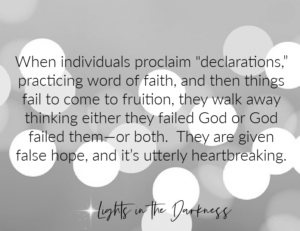
Y’all, there’s a pandemic!
No, I’m not referring to that physical virus spreading around.
I’m talking about a spiritual plague in our local churches—that of false conversion and apostasy.
We have people sitting on our pews every Sunday are who are in false conversion, and they don’t even know it! Likewise, we have people walking away from the faith left and right in what’s been termed “deconstruction,” many who label themselves “exvangelicals.”
*These might be people in our churches who have questions which are left unanswered, newer or weaker Christians who are not properly discipled, and when they meet a difficult situation, have a misunderstanding because they do not hold a biblical worldview or know sound biblical doctrine, encounter “church-hurt,” or some other difficulty in their Christian walk, they leave the church altogether; they walk away from the faith, from Christ. Many of which were possibly not even in true conversion anyway.
It’s no wonder, however, why so many are not truly saved and are walking away from Christianity. It’s because truth isn’t being shared, and there’s no proper discipleship. False teachings are rampant, and many fall prey with full innocence. I should know, because I’ve walked in those shoes. Read my story here and here —I was a naïve false convert—yes, there is such a thing!
Also, as I’ve said before and will continue to remind, church has become a “place” you go to hear a great band and inspirational speech, maybe receive a cup of coffee and a pastry, and send your kids off to have a fun time in some kids’ club. Or, on the flip side, the idea of church has become so individualistic, there’s no family, no growth, no true unity, no building up and spurring one another along, but rather people thinking as long as they’re “helping a brother out,” they’re in church.
We see this unbalance a lot. One extreme to the other. We see some local churches that are either all legalistic, rote tradition, mostly in man-made rules, or all “love,” lax and laid back with no order, not structure at all (including virtual “church”).
It’s so tragic, dear friends.
And, the thing is, self-proclaimed preachers, teachers, and disciples of Christ are out here causing the mess with false teachings and misconstrued ideology because they’ve only continued what they’ve learned (I’ve walked in those shoes, too!):
- Pray a simple, formula prayer. Believe in Jesus. Repent and “trust” in Jesus, and you’re saved. That’s it. Come as you are!
- Declare you will have that job! Name it, claim it! Just have faith, and you will receive that money you need. That house. That healing. Because Jesus is the way maker, miracle worker, promise keeper!
- Love God, love people. All there is to it!
- Oh, the story of David and Goliath. What does it tell us? You represent David and your problems are your Goliath. You can overcome all the Goliaths in your life! You can tear down your Jericho walls!
I could list so many, but let’s breakdown what we have.
- When individuals follow these popular methods of “salvation” (not genuinely comprehending justification [Atonement, conquering the penalty of sin], and not fulfilling submission to Christ, accepting His blood sacrifice with all the steps in obedience [please read this for more clarification], thus not receiving genuine salvation), they fail to grow and mature in the faith, thus never truly experiencing sanctification (true change, becoming increasingly holy and looking more like the image of Christ). They either continue in their delusion or they walk away and will not receive glorification (experiencing eternal life). We cannot oversimplify salvation into a single prayer1. It’s not biblical by any means. And, yes, repentance is very necessary, a crucial step in salvation, but “trust” is something loosely translated and doesn’t convey the full salvation plan. The Gospel and steps of salvation are listed on my home page. You can find a quick detour to those here.
1when referencing scripture such as Romans 10:9, It’s critical to understand one cannot derive the salvation plan by a single verse alone, but must look at Scripture as a whole, especially considering verses like Matthew 28: 19-20, Acts 2:38, and Mark 16:16 (again, it can be clarified here)
- When individuals proclaim these “declarations,” practicing word of faith, and then things fail to come to fruition, they walk away thinking either they failed God or God failed them—or both. They are given false hope, and it’s utterly heartbreaking. I’ve seen it happen over and over again. People’s lives and faith shattered because they believed Satan’s lies. They do not grasp the concept of praying God’s will be done. It’s always His will, not ours. If it was ours to demand, our will, we would be equal to or greater than God. You are not God. Word of faith is unbiblical and absolute garbage. You can find more about that here. The Model Prayer (Matthew 6:9-13) is a great example: “Your will be done.”

- When unsaved individuals hear dumbed-down, catchy slogans such as “love God, love people” from Christians, they aren’t getting the full narrative. First, they go off the premise of the only love they’ve ever known as unbelievers. A worldly love. Not God’s love. This can be a dangerous, non-judgmental, “all-you-need-is-love,” “coexist,” all-inclusive love. This walks the line of everyone creating their own set of truth. What works for you, how you are, is great. What works for me, how I am, is equally great. It’s how most people think with today’s definition of love and acceptance. Again, there needs to be balance. God is love (1 John 4:16), but He is also equally holy and justice and truth, a just judge (Romans 1:18-32; Ephesians 5:6; Romans 2:5-11; John 3:36). He doesn’t have love, holiness, justice, truth. He isn’t part love, holiness, justice, truth. He IS love, holiness, justice, truth, the very standard of them. He loves and disciplines, like any good parent (Hebrews 12:3-17). We have to know both sides of Him, and then we have to employee those in the love we show others (having a sacrificial, compassionate love which corrects and rebukes in love with all patience and gentleness—2 Timothy 2:25; 2 Timothy 4:2; 1 Timothy 5:20; Titus 1:13; 1 Thessalonians 2:11-12; 1 Thessalonians 5:14). I’ve written more about this subject in several articles:
Slogans
True Love
Tolerance
Second, on the other side of that same coin, when we proclaim “love God, love others” alone, we aren’t sharing the Gospel. Jesus says, “You shall love the Lord your God with all your heart and with all your soul and with all your mind. This is the great and first commandment. And a second is like it: You shall love your neighbor as yourself. On these two commandments depend all the Law and the Prophets” (Matthew 22:37-40). He was summating the OT Law, which He fulfilled. To only spout “love God, love others” paints a works-based, moralistic ideology as it reflects that OT Law (i.e. The Ten Commandments) and not Jesus Christ crucified for salvation and reconciliation through grace. Yes, we should most certainly love God first and foremost with all we are in holy obedience, which is our response to the Gospel, and we should love others the way we love ourselves (which simply means that we care about our own interests, so we should care about others’ interests the same and even more – Philippians 2:3-4). Loving God and others is a response to the Gospel as well as a result of salvation, the fruit we bear, not the Gospel itself.
- When individuals hear Scripture/Bible stories taken completely out of context with eisegesis (incorrectly interpreting the text with self in mind based on presuppositions/bias) instead of exegesis (properly interpreting text given the historical and literary contexts, the audience, and its overall original intent), they are led to believe lies about God’s Word. Many modern preachers and teachers do this all the time (another aspect of why we are warned against false teachings). How to remedy this? Read and study Scripture constantly—like the Bereans (Acts 17:11)—using multiple translations (my favorites are ESV Study, NASB Key Word Study, and TNIV Study) and reference tools to gain understanding of the original words and thoughts used (one reason I love using Blue Letter Bible for reference, getting to the root words and ways they were used in proper context). Avoid using loose, paraphrased versions (MSG version) of Scripture and books that try to pass off as translations (Passion “Translation”). I refer to these as “versions,” because they are not true, sound “translations.” They are highly misleading.
My personal preference in choosing translations
Friends, “DO NOT BE DECEIVED” appears frequently in Scripture. Scripture warns repeatedly about false teachers/prophets, false teachings, being on guard, standing against the wiles of the Devil, and the like. Why? Because of these exact cases, along with so many more. I’m sure you’ve heard it from me before, Satan is incredibly clever. He knows how to make wickedness look innocent and good—look Christian even. So, to serve as yet another reminder, BE ON GUARD!
You can read more on false conversion here and apostasy here
*I know some of my material in this entry is redundant, but I think these reminders cannot be emphasized enough. I implore you to read, study, and share!
References
All Scripture (unless otherwise noted): English Standard Version Bible. 2021. BibleHub.com and
English Standard Version Bible. 2016. Crossway
Logos Wiki. 2020. Bible Translation Spectrum. Retrieved September 30, 2021, from https://wiki.logos.com/Bible_Translation_Spectrum
